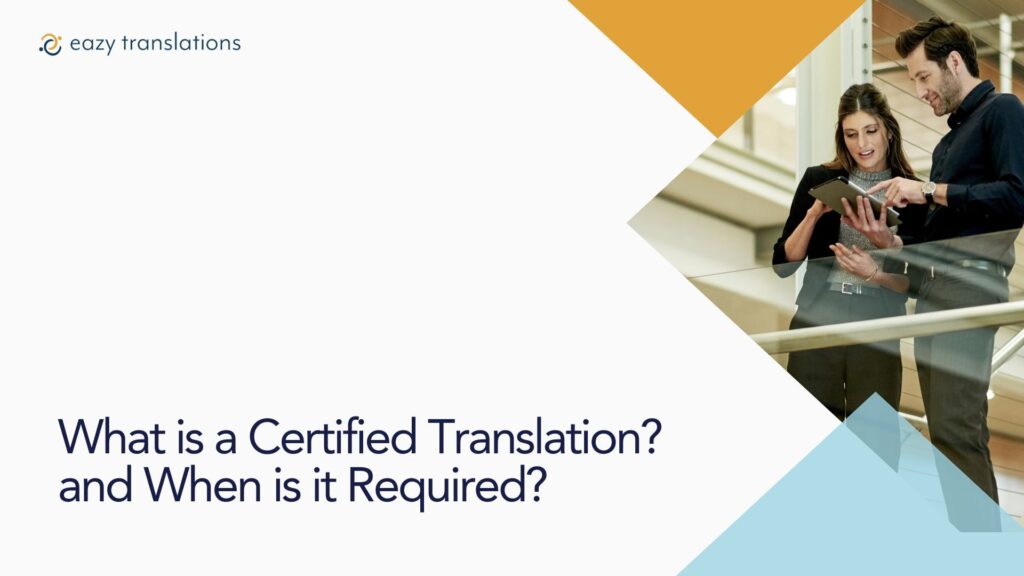
Contents
A certified translation is more than just a mere translation of text from one language to another. It is a legal document in its own right, with the translator or translation company declaring that the translated document accurately represents the original. This declaration may be required by various entities, like schools, courts, or government bodies, to establish the legitimacy of the translated document. However, it’s not always clear when a certified translation is necessary. Allow us to shed some light on this topic, to help you navigate whenever you find yourself needing this crucial service.
A certified translation is a specialized form of translation required in official and legal contexts. It involves a formal certification process that attests to the accuracy and completeness of the translation. The certification is typically provided by the translator or the translation company and includes a statement of accuracy, often with the translator’s credentials and signature. This process ensures that the translated document is a true and faithful representation of the original.
The need for certified translations arises in various scenarios. In legal proceedings, for instance, any document in a foreign language may need to be translated and certified to be admissible in court. Immigration processes are another common area where certified translations are essential. Government bodies, like the U.S. Citizenship and Immigration Services (USCIS), often require birth certificates, marriage certificates, and other personal documents to be submitted in a certified translated form.
Similarly, academic institutions and employers may require certified translations of academic transcripts and professional qualifications from applicants who have studied or worked in a different language. In the business world, certified translations are crucial for international contracts and agreements to ensure legal validity across different countries.
The certification process involves several steps. Firstly, a professional translator, fluent in both the source and target languages, translates the document. This translation is then reviewed and edited to ensure it matches the original document in terms of content, tone, and format. Following this, the translator or the translation agency provides a signed statement or certificate declaring the translation’s accuracy and completeness. In some cases, this certification may need to be notarized, which involves a notary public witnessing the signing of the certificate. It’s important to note that the requirements for certified translations can vary significantly depending on the country and the type of document, so it’s essential to verify the specific needs of the authority or body requesting the translation.
Certified translations differ from notarized translations, which are often confused. A certified translation focuses on the content’s accuracy and the translator’s qualifications. In contrast, a notarized translation involves a notary public who verifies the identity of the person signing the document. The notary does not attest to the accuracy of the translation itself.
When choosing a translator for a certified translation, it’s crucial to consider their professional qualifications and experience. Translators who are certified by recognised translation associations or have a proven track record in translating similar documents are preferable. The translator should also have expertise in the subject matter of the document to ensure that the translation is accurate and uses the appropriate terminology.
Certified translations pose several challenges. Maintaining the exact meaning, tone, and format of the original document can be difficult, especially with complex legal or technical documents. Cultural nuances and idiomatic expressions also need to be carefully handled to ensure the translation is appropriate for the target audience. Additionally, certified translations tend to be more expensive than standard translations due to the extra steps involved in the certification process, and they may take longer to complete, especially if notarization is required.
Certified translations are essential in various scenarios where the authenticity and accuracy of translated documents are crucial. As mentioned, these situations often involve legal, governmental, or official processes where documents originally in a foreign language need to be presented in a format that is recognised and trusted.
Here are detailed contexts and situations where certified translations are typically required:
Immigration Processes
Legal Proceedings
Academic Purposes
Professional Licensing and Employment
Business and Commerce
Governmental and Administrative Procedures
Medical and Health Care Settings
Insurance and Claims
Real Estate and Property Transactions
Adoption Procedures
Ultimately, certified translations go beyond being a bureaucratic requirement. They are a testament to the importance of accuracy and authenticity in global communication. They exist to ensure that everyone’s documents are given the recognition and validity they deserve, no matter the language they were originally written in. In a world where international interactions are common, certified translations are essential for facilitating clear, accurate, and trustworthy communication.
So, whether you are a business owner looking to expand into international markets, an individual seeking to immigrate or study abroad, or someone in need of legal or medical services in a foreign country, certified translations can help bridge the language barrier and simplify the process. With their accuracy, reliability, and compliance with regulations, certified translations play a crucial role in making global communication more accessible.